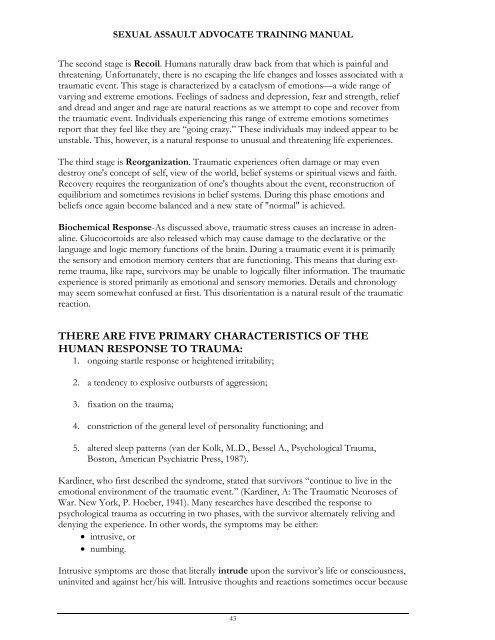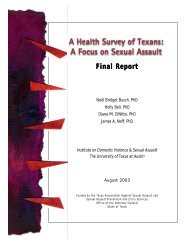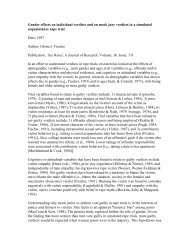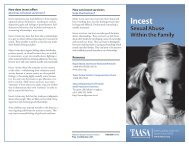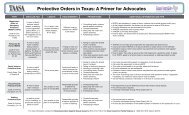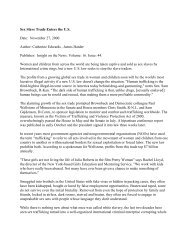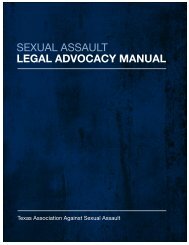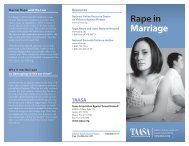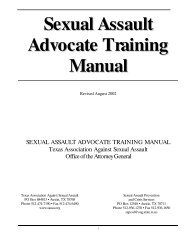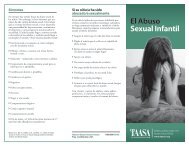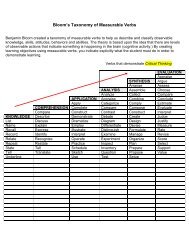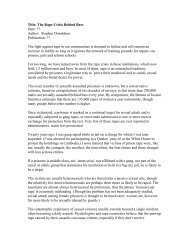Sexual Assault Advocate Training Manual - Texas Association ...
Sexual Assault Advocate Training Manual - Texas Association ...
Sexual Assault Advocate Training Manual - Texas Association ...
You also want an ePaper? Increase the reach of your titles
YUMPU automatically turns print PDFs into web optimized ePapers that Google loves.
SEXUAL ASSAULT ADVOCATE TRAINING MANUAL<br />
The second stage is Recoil. Humans naturally draw back from that which is painful and<br />
threatening. Unfortunately, there is no escaping the life changes and losses associated with a<br />
traumatic event. This stage is characterized by a cataclysm of emotions—a wide range of<br />
varying and extreme emotions. Feelings of sadness and depression, fear and strength, relief<br />
and dread and anger and rage are natural reactions as we attempt to cope and recover from<br />
the traumatic event. Individuals experiencing this range of extreme emotions sometimes<br />
report that they feel like they are “going crazy.” These individuals may indeed appear to be<br />
unstable. This, however, is a natural response to unusual and threatening life experiences.<br />
The third stage is Reorganization. Traumatic experiences often damage or may even<br />
destroy one's concept of self, view of the world, belief systems or spiritual views and faith.<br />
Recovery requires the reorganization of one's thoughts about the event, reconstruction of<br />
equilibrium and sometimes revisions in belief systems. During this phase emotions and<br />
beliefs once again become balanced and a new state of "normal" is achieved.<br />
Biochemical Response-As discussed above, traumatic stress causes an increase in adrenaline.<br />
Glucocortoids are also released which may cause damage to the declarative or the<br />
language and logic memory functions of the brain. During a traumatic event it is primarily<br />
the sensory and emotion memory centers that are functioning. This means that during extreme<br />
trauma, like rape, survivors may be unable to logically filter information. The traumatic<br />
experience is stored primarily as emotional and sensory memories. Details and chronology<br />
may seem somewhat confused at first. This disorientation is a natural result of the traumatic<br />
reaction.<br />
THERE ARE FIVE PRIMARY CHARACTERISTICS OF THE<br />
HUMAN RESPONSE TO TRAUMA:<br />
1. ongoing startle response or heightened irritability;<br />
2. a tendency to explosive outbursts of aggression;<br />
3. fixation on the trauma;<br />
4. constriction of the general level of personality functioning; and<br />
5. altered sleep patterns (van der Kolk, M..D., Bessel A., Psychological Trauma,<br />
Boston, American Psychiatric Press, 1987).<br />
Kardiner, who first described the syndrome, stated that survivors “continue to live in the<br />
emotional environment of the traumatic event.” (Kardiner, A: The Traumatic Neuroses of<br />
War. New York, P. Hoeber, 1941). Many researches have described the response to<br />
psychological trauma as occurring in two phases, with the survivor alternately reliving and<br />
denying the experience. In other words, the symptoms may be either:<br />
• intrusive, or<br />
• numbing.<br />
Intrusive symptoms are those that literally intrude upon the survivor’s life or consciousness,<br />
uninvited and against her/his will. Intrusive thoughts and reactions sometimes occur because<br />
43


